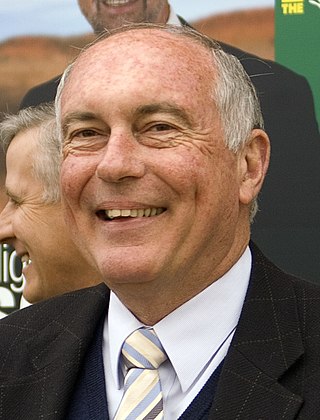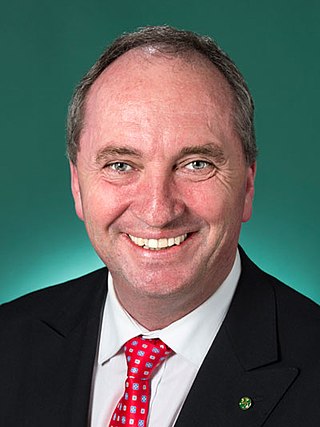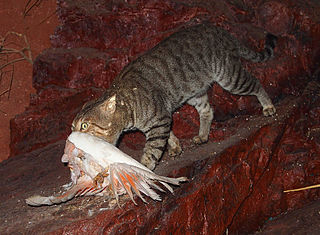Related Research Articles

The cane toad, also known as the giant neotropical toad or marine toad, is a large, terrestrial true toad native to South and mainland Central America, but which has been introduced to various islands throughout Oceania and the Caribbean, as well as Northern Australia. It is a member of the genus Rhinella, which includes many true toad species found throughout Central and South America, but it was formerly assigned to the genus Bufo.

John Christopher Depp II is an American actor and musician. He is the recipient of multiple accolades, including a Golden Globe Award and a Screen Actors Guild Award, and has been nominated for three Academy Awards and two BAFTA awards.

Warren Errol Truss is a former Australian politician who served as the 16th Deputy Prime Minister of Australia and Minister for Infrastructure and Regional Development in the Abbott government and the Turnbull government. Truss served as the federal leader of the National Party of Australia between 2007 and 11 February 2016 when he announced his decision to retire and not contest the 2016 federal election. He was the member of the House of Representatives for Wide Bay from the 1990 election until his retirement in May 2016. Following the merger of the Queensland branches of the Nationals and Liberals, Truss was re-elected in 2010 for the Liberal National Party.

Invasive species in Australia are a serious threat to the native biodiversity, and an ongoing cost to Australian agriculture. Numerous species arrived with European maritime exploration and colonisation of Australia and steadily since then.

Barnaby Thomas Gerard Joyce is an Australian politician who served as the leader of the National Party of Australia from 2016 to 2018 and again from 2021 to 2022. Joyce served as the 17th deputy prime minister of Australia during both his leadership tenures under Prime Minister Malcolm Turnbull from 2016 to 2018 and Prime Minister Scott Morrison from 2021 to 2022.

A feral pig is a domestic pig which has gone feral, meaning it lives in the wild. The term feral pig has also been applied to wild boars, which can interbreed with domestic pigs. They are found mostly in the Americas and Australia. Razorback and wild hog are Americanisms applied to feral pigs or boar–pig hybrids.

Fiona Joy Nash is a former Australian politician. She served as a Senator for New South Wales from 2005 to 2017, representing the National Party. She was the party's deputy leader from 2016 to 2017 and was a cabinet minister in the Turnbull government.

Duttaphrynus melanostictus is commonly called Asian common toad, Asian black-spined toad, Asian toad, black-spectacled toad, common Sunda toad, and Javanese toad. It is probably a complex of more than one true toad species that is widely distributed in South and Southeast Asia.

Environmental issues in Australia describes a number of environmental issues which affect the environment of Australia. There are a range of such issues, some of the relating to conservation in Australia while others, for example the deteriorating state of Murray-Darling Basin, have a direct and serious effect on human land use and the economy.
Walter Wilson Froggatt was an Australian economic entomologist.

Amber Laura Heard is an American actress. She had her first leading role in the horror film All the Boys Love Mandy Lane (2006), and went on to star in films such as The Ward (2010), Drive Angry (2011), and London Fields (2018). She has also had supporting roles in films including Pineapple Express (2008), Never Back Down (2008), The Joneses (2009), The Rum Diary (2011), Paranoia (2013), Machete Kills (2013), Magic Mike XXL (2015), and The Danish Girl (2015). Heard is part of the DC Extended Universe franchise, playing Mera in Justice League (2017) and Aquaman (2018). She has also acted in television series such as The CW's teen drama Hidden Palms (2007) and the Paramount+'s fantasy series The Stand (2020).

Darren Jeffrey Chester is an Australian politician. He has been a member of the House of Representatives for Gippsland in Victoria, representing the Nationals since 2008. Chester had served as the Minister for Veterans' Affairs and the Minister for Defence Personnel between March 2018 and July 2021 in the Turnbull and Morrison governments. He was also Minister Assisting the Prime Minister for the Centenary of ANZAC until May 2019.
Toad Day Out is a pest control event which takes place in Queensland, Australia on the 29 March of each year. Its focus is to reduce the population of the invasive cane toad. The toads are caught live and unharmed. The day was originally advocated by politician Shane Knuth.
The cane toad in Australia is regarded as an exemplary case of an invasive species. Australia's relative isolation prior to European colonisation and the industrial revolution, both of which dramatically increased traffic and import of novel species, allowed development of a complex, interdepending system of ecology, but one which provided no natural predators for many of the species subsequently introduced. The recent, sudden inundation of foreign species has led to severe breakdowns in Australian ecology, after overwhelming proliferation of a number of introduced species, for which the continent has no efficient natural predators or parasites, and which displace native species; in some cases, these species are physically destructive to habitat, as well. Cane toads have been very successful as an invasive species, having become established in more than 15 countries within the past 150 years.</ref> In the Environment Protection and Biodiversity Conservation Act 1999, the Australian government listed the impacts of the cane toad as a "key threatening process".
Red foxes pose a serious conservation problem in Australia. 2012 estimates indicate that there are more than 7.2 million red foxes, with a range extending throughout most of the continental mainland. The species became established in Australia through successive introductions, by settlers, beginning around the 1830s. Due to its rapid spread and ecological impact, it has been classified as one of the most damaging invasive species in Australia.

Richard Shine is an Australian evolutionary biologist and ecologist; he has conducted extensive research on reptiles and amphibians, and proposed a novel mechanism for evolutionary change. He is currently a Professor of Biology at Macquarie University, and an Emeritus Professor at The University of Sydney.

Cats are an invasive species in Australia. Because they are not native to Australia and were only introduced by European colonists as pets in the early 1800s, native Australian animals did not co-evolve with them. As of 2016, some 3.8 million domestic cats and up to 6.3 million feral cats continue to live in Australia.
Australia has a population of about 25 million, with the Commonwealth Government's 2019 survey estimating there are 640,000 recreational hunters in the country. There are around 5.8 million legally owned guns in Australia, ranging from airguns to single-shot, bolt-action, pump-action, lever-action or semi-automatic firearms.
The Invasive Species Council is an Australian environmental non-governmental organisation founded in 2002 to provide a specialist policy and advocacy focus on reducing the threat of invasive species that threaten the environment.
References
- 1 2 "Barnaby Joyce 'humbled' after being honoured over expelling Johnny Depp's dogs Pistol and Boo". ABC News. 18 December 2015. Retrieved 6 July 2017.
- 1 2 3 4 "Froggatt Awards 2017". Invasive Species Council. Retrieved 6 July 2017.
- 1 2 3 Wright, Lindsay (12 September 2005). "Stuffed cane toad award is important". ABC Rural. Retrieved 6 July 2017.
- 1 2 Traill, Barry (1 March 2004). "Winner of the Froggatt Award 2003 - Barbara Waterhouse" (PDF). Feral Herald. Invasive Species Council. Retrieved 9 July 2017.
- 1 2 3 "2006 ISC Award for Bumblebee Campaigner" (PDF). Feral Herald. Invasive Species Council. 1 August 2006. Retrieved 9 July 2017.
- ↑ A small sample of the Barnaby Joyce coverage:
- ↑ Faulkner, Richard (Autumn 2017). "Froggatt Award goes to the TSC cat campaigner" (PDF). Science for saving species. Threatened Species Recovery Hub. Retrieved 6 July 2017.
- ↑ "Volunteers receive award for work removing invasive species". ABC RN Breakfast. 1 February 2017. Retrieved 17 June 2017.
- ↑ Hunt, Elle (17 December 2015). "Johnny Depp's dogs: Barnaby Joyce wins principled decision-making award". The Guardian. Guardian News and Media. Retrieved 6 July 2017.
- 1 2 3 4 "Froggatt Awards 2015". Invasive Species Council. Retrieved 6 July 2017.
- ↑ Atfield, Cameron (18 December 2015). "Johnny Depp's dogs: Barnaby Joyce wins gong for tough stance on Pistol and Boo". Sydney Morning Herald. Fairfax Media. Retrieved 6 July 2017.
- ↑ "WET TROPICS YELLOW CRAZY ANT ERADICATION EFFORTS RECOGNISED". Wet Tropics Management Authority. Retrieved 6 July 2017.
- ↑ "Vice Chancellor's Report to Council 26 February 2016" (PDF). James Cook University. 26 February 2016. Retrieved 6 July 2017.
- ↑ "Lori Lach receives award from Invasive Species Council". James Cook University. Retrieved 9 July 2017.
- ↑ "2004 Froggatt Award - Marine pest eradicators receive ISC award" (PDF). Feral Herald. Invasive Species Council. 1 March 2005. Retrieved 9 July 2017.
- ↑ "SEASTAR TEAM 2004 – A Partnership between the Community and Government to Eradicate a Marine Pest" (PDF). Coastline. Department of Sustainability and Environment. Retrieved 9 July 2017.
- ↑ "CRC weed fighters honoured" (PDF). Savanna Links. Tropical Savannas CRC. July–December 2005. Retrieved 6 July 2017.
- ↑ "Tropical Grassy Weed Fighters win 2005 Froggatt Award" (PDF). Feral Herald. Invasive Species Council. 1 May 2006. Retrieved 9 July 2017.